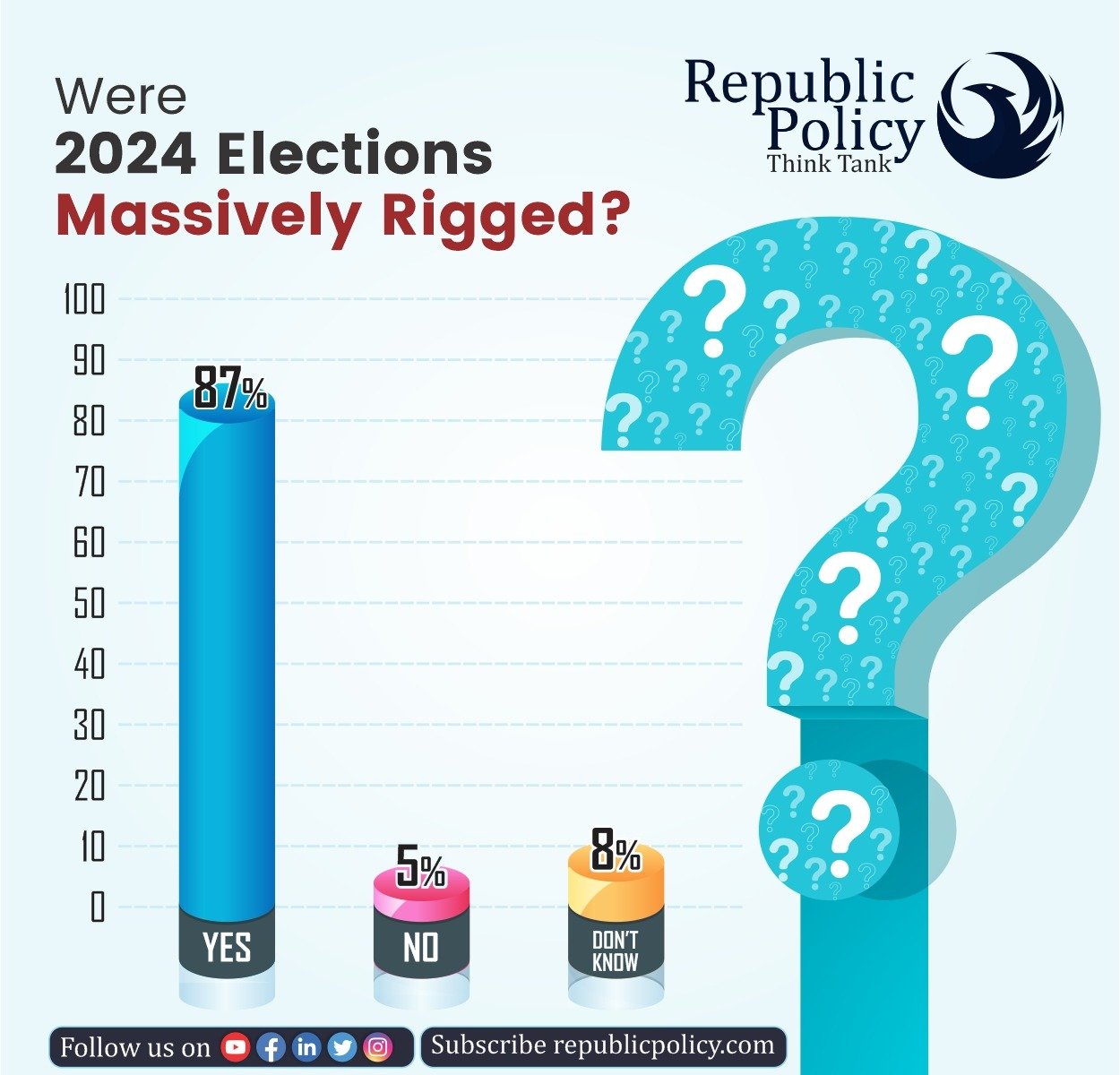Mubashar Nadeem
Pleasse, read the RP Lahore Survey Report to understand this sub-report:
Analysis:
The Republic Policy July 2025 Survey presents a sobering reflection of Lahore’s political mood, revealing that 87% of the city’s citizens believe the 2024 general elections were marred by manipulation. This widespread perception of electoral malpractice is not a marginal sentiment—it is the prevailing view that continues to shape political behaviour, attitudes toward governance, and the city’s willingness to engage with existing political structures. Such an overwhelming consensus of mistrust is rare in democratic societies, yet in Lahore, it has become the defining feature of post-election discourse.
Follow Republic Policy Website
For the Pakistan Muslim League-Nawaz (PML-N), this perception has translated into a particularly stubborn political challenge. In an environment where voters believe their mandate was stolen, the ability of any political party—especially one seen as a beneficiary of alleged rigging—to win hearts and minds becomes exceptionally limited. The survey findings confirm that the party has struggled to convince the electorate of its legitimacy, unable to offer reassurance to citizens who view themselves as victims of systemic injustice. In such a climate, even well-crafted political initiatives risk falling flat.
Follow Republic Policy YouTube
This entrenched belief in electoral manipulation has deep and lasting consequences for Lahore’s political landscape. Historically, major urban centres like Lahore have been breeding grounds for political activism, reform movements, and shifts in voter loyalty. However, when voters feel their choice is irrelevant, their motivation to shift allegiance or engage in policy debates diminishes sharply. The 2025 survey suggests that political stagnation has set in, with public opinion calcifying rather than evolving. Without substantial electoral reforms, the political currents in Lahore are likely to remain frozen, resistant to both persuasion and change.
Follow Republic Policy Twitter
The implications go far beyond party politics. Erosion of public trust in the ballot box strikes at the very foundation of democracy. Elections are not merely mechanisms for selecting leaders; they are the primary instruments through which citizens exercise sovereignty. When the electoral process is perceived as compromised, democratic legitimacy suffers, weakening the moral and legal authority of those in power. This in turn undermines the policymaking process, as laws and reforms introduced by a distrusted leadership struggle to gain public compliance and moral acceptance.
Follow Republic Policy Facebook
The survey’s findings also expose a dangerous feedback loop. A citizenry that distrusts the electoral process may choose to disengage from voting altogether, leading to lower turnouts. Lower participation rates make elections more susceptible to manipulation, further eroding trust. This cycle of disengagement and delegitimisation creates fertile ground for political instability, protest movements, and governance paralysis. In Lahore, where civic consciousness is high, such disillusionment risks transforming passive scepticism into active resistance.
This discontent is not unique to Lahore, but the city’s symbolic weight amplifies its significance. As Pakistan’s cultural and political nerve centre, Lahore’s political mood often foreshadows broader national trends. If distrust in the electoral system continues unchecked here, it could spill over into other major urban centres, catalysing a national crisis of legitimacy. The country’s democratic health depends heavily on reversing this trajectory before mistrust becomes irreversibly entrenched.
Follow Republic Policy Website
The policy implications are clear: electoral reforms must take precedence over partisan gains. Independent oversight bodies must be empowered, electoral rolls must be cleansed and digitised, voting technology must be secured, and transparent counting mechanisms must be implemented. Equally critical is the political will to allow judicial and constitutional safeguards to function without interference. The restoration of trust is not a technical matter alone—it is a political and moral imperative.
Follow Republic Policy YouTube
In conclusion, Lahore’s prevailing disillusionment is not merely a reflection of post-election dissatisfaction; it is a warning signal for Pakistan’s democratic future. If 87% of the city’s electorate believes their votes did not count, the legitimacy of the entire political order stands in question. The path forward requires a collective commitment—from political parties, institutions, and civil society alike—to prioritise electoral integrity over short-term advantage. Without such reforms, Pakistan risks a democracy that exists in name but not in practice, leaving citizens alienated and governance perpetually unstable.
















